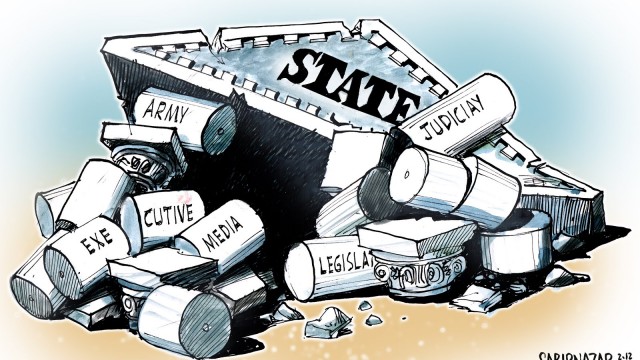Panama Leaks – Democracy In Tears
Democracy means that the people have full power to control their destinies excluding any form of directive rule of other limbs of executives and judiciary present in a state structure. The elected political elite are the ones controlling the destinies of the general public. Th election of elected representatives on treasury benches as well as on opposition benches of Parliament governs the destiny of citizens through constitutional amendments and law making. This function of legislature to legislate confers a unique status to these elected representatives of the general public, which is neither available to the executive branch of government nor vested in jurisdictions of our judicial system.
Conceptually and practically, democracy is directly linked with the legislature which is a manifestation of the will, wants and wishes of public, however the other two limbs of state referred to as executive and judiciary are custodians and guarantors of democratic values. Therefore democracy gets a body by the legislature and a soul by the judiciary and executive.
The legislature and its members assume and exercise the single most important constitutional duty conferred upon them by the Constitution of Pakistan, 1973 and imposed upon them by the Representation of Peoples Act, 1976, which is, to represent the constituencies they belong to and to represent the people living in it. In this way all citizens are represented by these elected representatives who in no way can abandon, forego or give up this fundamental role to any other limb of the state, be it executive or judiciary.
In the past few years, the people of Pakistan have witnessed repeatedly that in wake of scandals and critical issues capturing the nation’s political landscape, be it the Memogate Scandal, the Judicial Commission on 2013 elections or Panama Leaks, their elected representatives have not only ignored exercising this duty of representing the nation as per its wishes through the houses of Parliament but have also practically abandoned this duty by shifting the burden to the judicial limb of the state i.e. the Supreme Court of Pakistan with the mandate to reach a logical conclusion.
The ever striking question in such circumstances is whether the people of Pakistan shall be represented by the findings of a judicial commission comprising of judges of the top court of Pakistan. Constitutionally, the concept of separation of powers among organs of state is seriously challenged if Parliament in wake of such findings takes a decision. Furthermore, even democratically speaking most fundamental democratic value of people’s representation in essence become absent when the decision of Parliament is dependent upon the findings of a few judges and resultantly the self-accountability mechanism in Parliament never reaches the age of maturity.
The judicial perspective on the other side is not less interesting. Dignity and respect for the judiciary is always required to ensure the moral authority vested in it. Whenever a political question or a question having political ramifications is placed before respectable judges, there is always a danger of soft revolt in the form of protests by people having different opinions. This particular state of affairs covertly challenges the authority vested in the judiciary which directly affects the strength of a state structure. In such a case, who is to blame more and who is to accuse less? The answer is simple. These are our politically elected representatives who first refer the matter to the judiciary, then reject the findings of the members of judicial commissions in large political gatherings of their parties set up on roads, covered by the media nationwide and challenging the dignity of our all too important judicial system and shaking the trust in our lawmakers a.k.a the political representatives of fellow citizens.
When the country goes in a catch-22 situation and where parliamentary supremacy becomes non-existent and judicial authority is disrespected, there comes in a non-democratic force referred to as the ‘establishment’ by our popular media talkshows, which tries to bridge the gaps. Then however, to our misfortune, the people’s representatives once again commit a mistake and in spite of assuming and exercising their all important role to represent people, they start calling and portraying the establishment as an anti-democratic force. Alas! The fabric of the state becomes looser, citizens go unrepresented, the dignity of judiciary is challenged and the establishment is declared anti democratic.
In the words of Samuel Adams, one of the founding fathers of United States of America, “In all free states the constitution is fixed; and as the supreme legislative derives its power and authority from the constitution, it cannot overleap the bounds of it without destroying its own foundation.”
The views expressed in this article are those of the author and do not necessarily represent the views of CourtingTheLaw.com or any organization with which he might be associated.


